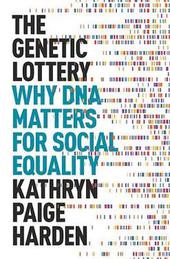
|
The Genetic Lottery: Why DNA Matters for Social Equality
Paperback / softback
Main Details
| Title |
The Genetic Lottery: Why DNA Matters for Social Equality
|
| Authors and Contributors |
By (author) Kathryn Paige Harden
|
| Physical Properties |
| Format:Paperback / softback | | Pages:240 | | Dimensions(mm): Height 216,Width 140 |
|
| Category/Genre | Ethics and moral philosophy |
|---|
| ISBN/Barcode |
9780691232935
|
| Classifications | Dewey:304.5 |
|---|
| Audience | |
|---|
| Illustrations |
22 b/w illus.
|
|
Publishing Details |
| Publisher |
Princeton University Press
|
| Imprint |
Princeton University Press
|
| Publication Date |
21 September 2021 |
| Publication Country |
United States
|
Description
A provocative and timely case for how the science of genetics can help create a more just and equal society In recent years, scientists like Kathryn Paige Harden have shown that DNA makes us different, in our personalities and in our health - and in ways that matter for educational and economic success in our current society. In The Genetic Lottery, Harden introduces readers to the latest genetic science, dismantling dangerous ideas about racial superiority and challenging us to grapple with what equality really means in a world where people are born different. Weaving together personal stories with scientific evidence, Harden shows why our refusal to recognise the power of DNA perpetuates the myth of meritocracy, and argues that we must acknowledge the role of genetic luck if we are ever to create a fair society. Reclaiming genetic science from the legacy of eugenics, this groundbreaking book offers a bold new vision of society where everyone thrives, regardless of how one fares in the genetic lottery. 'This brilliant book is without a doubt the very best exposition on our genes, how they influence quite literally everything about us, and why this means we should care more, not less, about the societal structures in which we live.' - Angela Duckworth, author of Grit 'To me, the aim of genetic research should be threefold: to find out which differences between people are real, which of those matter, and how to use that knowledge to get the best outcomes for all people. This fascinating book is a step toward that goal.' - David Epstein, author of Range 'Harden expertly explains what we can-and importantly, can't-take away from genetic research, and does so without shying away from the complexities or controversies. Nobody should be allowed to opine about genetics in public until they've read this book.' - Stuart Ritchie, author of Science Fictions 'A thoughtful, brave, and very engaging book. In contrast both to those who see genetic differences as justifying hierarchy and to those who reject the study of the influence of genes on social stratification, Harden argues that understanding the findings of behavioral genetics is essential if we are to create a more just society.' - Peter Singer, Princeton University 'The Genetic Lottery is a must-read for anyone who cares about understanding why humans differ from one another. Harden lights a clear path toward an anti-eugenic genetics that embraces human diversity and works toward equity for all humans.' - Russell A. Poldrack, author of Hard to Break 'Compelling and highly readable. Harden dispels the myths that genes are destiny, that their influence is all-or-none, and that those who work on genetics are eugenicists. She makes a persuasive case that if we understand genes this can help us work towards a fairer society.' - Dorothy Bishop, University of Oxford
Author Biography
Kathryn Paige Harden is professor of clinical psychology at the University of Texas at Austin, where she is director of the Developmental Behavior Genetics Lab.
Reviews"A thoughtful, brave, and very engaging book. In contrast both to those who see genetic differences as justifying hierarchy and to those who reject the study of the influence of genes on social stratification, Harden argues that understanding the findings of behavioral genetics is essential if we are to create a more just society."--Peter Singer, Princeton University "This brilliant book is without a doubt the very best exposition on our genes, how they influence quite literally everything about us, and why this means we should care more, not less, about the societal structures in which we live."--Angela Duckworth, author of Grit
|